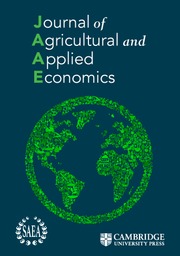Crossref Citations
This article has been cited by the following publications. This list is generated based on data provided by
Crossref.
Park, William M.
Lamons, Kevin S.
and
Roberts, Roland K.
2002.
Factors Associated with Backyard Composting Behavior at the Household Level.
Agricultural and Resource Economics Review,
Vol. 31,
Issue. 2,
p.
147.
Caplan, Arthur J
Grijalva, Therese C
and
Jakus, Paul M
2002.
Waste not or want not? A contingent ranking analysis of curbside waste disposal options.
Ecological Economics,
Vol. 43,
Issue. 2-3,
p.
185.
Bor, Yunchang Jeffrey
Chien, Yu-Lan
and
Hsu, Esher
2004.
The market-incentive recycling system for waste packaging containers in Taiwan.
Environmental Science & Policy,
Vol. 7,
Issue. 6,
p.
509.
Ando, Amy W.
and
Gosselin, Anne Y.
2005.
RECYCLING IN MULTIFAMILY DWELLINGS: DOES CONVENIENCE MATTER?.
Economic Inquiry,
Vol. 43,
Issue. 2,
p.
426.
Peretz, Jean H
Tonn, Bruce E
and
Folz, David H
2005.
Explaining the Performance of Mature Municipal Solid Waste Recycling Programs.
Journal of Environmental Planning and Management,
Vol. 48,
Issue. 5,
p.
627.
Berglund, Christer
2006.
The assessment of households' recycling costs: The role of personal motives.
Ecological Economics,
Vol. 56,
Issue. 4,
p.
560.
BEATTY, TIMOTHY K. M.
BERCK, PETER
and
SHIMSHACK, JAY P.
2007.
CURBSIDE RECYCLING IN THE PRESENCE OF ALTERNATIVES.
Economic Inquiry,
Vol. 45,
Issue. 4,
p.
739.
., M.d. Wahid Murad
and
., Chamhuri Siwar
2007.
Knowledge, Attitude and Behavior of the Urban Poor Concerning Solid Waste Management: A Case Study.
Journal of Applied Sciences,
Vol. 7,
Issue. 22,
p.
3356.
Bouvier, Rachel
and
Wagner, Travis
2011.
The influence of collection facility attributes on household collection rates of electronic waste: The case of televisions and computer monitors.
Resources, Conservation and Recycling,
Vol. 55,
Issue. 11,
p.
1051.
Gellynck, X.
Jacobsen, R.
and
Verhelst, P.
2011.
Identifying the key factors in increasing recycling and reducing residual household waste: A case study of the Flemish region of Belgium.
Journal of Environmental Management,
Vol. 92,
Issue. 10,
p.
2683.
Matsumoto, Shigeru
2011.
Waste separation at home: Are Japanese municipal curbside recycling policies efficient?.
Resources, Conservation and Recycling,
Vol. 55,
Issue. 3,
p.
325.
Wagner, Travis P.
2013.
Examining the concept of convenient collection: An application to extended producer responsibility and product stewardship frameworks.
Waste Management,
Vol. 33,
Issue. 3,
p.
499.
Lane, Gordon W.S.
and
Wagner, Travis P.
2013.
Examining recycling container attributes and household recycling practices.
Resources, Conservation and Recycling,
Vol. 75,
Issue. ,
p.
32.
Jacobsen, R.
Buysse, J.
and
Gellynck, X.
2013.
Cost comparison between private and public collection of residual household waste: Multiple case studies in the Flemish region of Belgium.
Waste Management,
Vol. 33,
Issue. 1,
p.
3.
Yuan, Yalin
and
Yabe, Mitsuyasu
2014.
Residents’ Willingness to Pay for Household Kitchen Waste Separation Services in Haidian and Dongcheng Districts, Beijing City.
Environments,
Vol. 1,
Issue. 2,
p.
190.
Lakhan, Calvin
2015.
North of the 46° parallel: Obstacles and challenges to recycling in Ontario’s rural and northern communities.
Waste Management,
Vol. 44,
Issue. ,
p.
216.
Yuan, Yalin
Nomura, Hisako
Takahashi, Yoshifumi
and
Yabe, Mitsuyasu
2016.
Model of Chinese Household Kitchen Waste Separation Behavior: A Case Study in Beijing City.
Sustainability,
Vol. 8,
Issue. 10,
p.
1083.
Pachón Ariza, Fabio Alberto
Bokelmann, Wolfgang
and
Ramírez Miranda, César Adrián
2017.
Heritage and patrimony of the peasantry framework to address rural development and its application in Colombia.
Acta Agronómica,
Vol. 66,
Issue. 3,
p.
347.
Ahmadi, Siroos
2018.
Effects of the Environmental Attitude and Responsibility on Household Waste Separation: Evidence from Iranian Married Women.
The Open Psychology Journal,
Vol. 11,
Issue. 1,
p.
25.
Florkowski, Wojciech J.
2020.
PLASTIC WASTE AND ITS REMOVAL BY LICENSED HORTICULTURAL FIRMS IN GEORGIA, USA.
Annals of the Polish Association of Agricultural and Agribusiness Economists,
Vol. XXII,
Issue. 4,
p.
53.




